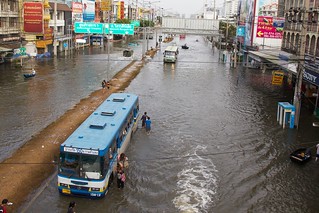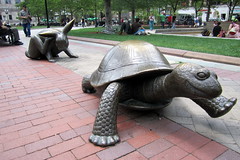What Does the Fox Say? Top Ten Ideas From City Fox

Chances are by now you’ve seen the video ‘What Does the Fox Say?’ The Ylvis brothers developed a catchy music video starting in Norway and spreading like a wild fire across the planet, jumping from city to city. In less than a week 15 million people watched the fox dance and try to make his case.
Videos and other social media are emerging as one of the most powerful forces shaping countries and cities. For example, Oscar Morales and his Facebook campaign to ban FARC in Colombia, the Arab Spring, and Toronto’s recent police shootings and earlier G20 beatings (video taped and shared widely – police charged and convicted).
Videos and other social media are emerging as one of the most powerful forces shaping countries and cities. For example, Oscar Morales and his Facebook campaign to ban FARC in Colombia, the Arab Spring, and Toronto’s recent police shootings and earlier G20 beatings (video taped and shared widely – police charged and convicted).


 Canadians are supposed to be good in a few things: skating, painting trees and rocks, welcoming newcomers, writing engaging stories that surely must have a meaning in there somewhere, and paddling a canoe. The canoe—a bit like the moose—holds an almost mythic place in the Canadian psyche. Anything and everything can be compared to canoeing. This metaphor is apt when applied to city administration.
Canadians are supposed to be good in a few things: skating, painting trees and rocks, welcoming newcomers, writing engaging stories that surely must have a meaning in there somewhere, and paddling a canoe. The canoe—a bit like the moose—holds an almost mythic place in the Canadian psyche. Anything and everything can be compared to canoeing. This metaphor is apt when applied to city administration. A helpful way for young math students to grasp the concept of exponential growth is to look at water lilies growing on a pond. They grow exponentially and double in area each day. If they will fully cover the pond by the 30th day, on what day is the lake half covered? The twenty-ninth day
A helpful way for young math students to grasp the concept of exponential growth is to look at water lilies growing on a pond. They grow exponentially and double in area each day. If they will fully cover the pond by the 30th day, on what day is the lake half covered? The twenty-ninth day For bees, bigger hives are better.
For bees, bigger hives are better.  ‘From there to here, from here to there, funny things are everywhere!’
‘From there to here, from here to there, funny things are everywhere!’ ‘Lord give me patience, but please hurry.’
‘Lord give me patience, but please hurry.’ Punxsutawney, Pennsylvania: Saturday around 7:00 am, Punxsutawney Phil (PA, USA) emerged from his burrow, did not see his shadow and predicted an early end to winter. A few minutes later and a few hundred miles north, Wiarton Willie (ON, Canada) surfaced, didn’t see his (or is it her) shadow and also predicted an early spring.
Punxsutawney, Pennsylvania: Saturday around 7:00 am, Punxsutawney Phil (PA, USA) emerged from his burrow, did not see his shadow and predicted an early end to winter. A few minutes later and a few hundred miles north, Wiarton Willie (ON, Canada) surfaced, didn’t see his (or is it her) shadow and also predicted an early spring. First the good news: Earlier this month, Mayor Iñaki Azkuna of Bilbao, Spain was awarded the prestigious
First the good news: Earlier this month, Mayor Iñaki Azkuna of Bilbao, Spain was awarded the prestigious  As of January 1st, I’m officially ‘retired’ from the World Bank. This is a dozen years before I had to retire, but I wanted to move back to Ontario for love and opportunity. However, I’ve already come to the conclusion that if you care about sustainable development and cities, you can never fully leave the World Bank.
As of January 1st, I’m officially ‘retired’ from the World Bank. This is a dozen years before I had to retire, but I wanted to move back to Ontario for love and opportunity. However, I’ve already come to the conclusion that if you care about sustainable development and cities, you can never fully leave the World Bank. Jesus and Muhammad traveled to the wilderness to develop their teachings. Even Gautama Buddha is said to have sat quietly beneath the rural Bohdi tree while he waited for enlightenment. But once they knew what needed to be said, all three men travelled to the closest city to convey the message.
Jesus and Muhammad traveled to the wilderness to develop their teachings. Even Gautama Buddha is said to have sat quietly beneath the rural Bohdi tree while he waited for enlightenment. But once they knew what needed to be said, all three men travelled to the closest city to convey the message.